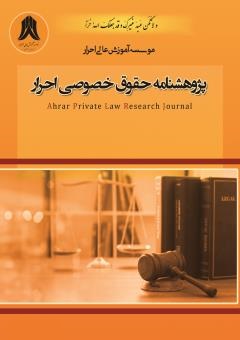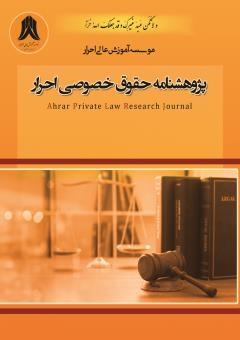Legislation and Regulation of Filtering Regulations, the Requirement To Apply Correct Governance in Cyber Space
Subject Areas : Civil Law
Keywords: Filtering, Cyberspace, Filtering Regulation and Legislation, Cyberspace Governance ,
Abstract :
Proper access to the cyber space and the possibility of interaction and exchange of information freely in the mentioned space is one of the basic rights of the citizens of different societies of the world. The citizens of Iran are not exempted from this rule, and according to several provisions, including the principles of the Constitution of Iran, it has been specified to provide this basic right of citizenship. Filtering, which violates this fundamental right of the general public, has been applied in different ways in the country for years. it is obvious that this issue has made governance in the country face serious challenges and has also violated the power of cyber governance of the Islamic Republic of Iran in various fields. therefore, one of the requirements for correct governance of cyberspace is to carry out legislative measures and create mechanisms to improve and strengthen the current system of regulating the laws and regulations of the country in the field of cyberspace filtering. The purpose of this article, which is written in a descriptive-analytical way, is to investigate and analyze the legal issues surrounding the issue that the regulation of regulations governing the filtering of cyber space has played a significant role in improving the level of management and monitoring of the country's virtual space and the governance of virtual space in accordance with will make it possible with Islamic-Iranian policies, norms and values.
1. Omidi, F & Keshavarz Muveidi, A, (2022), Civil Responsibility and Filtering of Virtual Space, National Conference of Professor Amir Nasser Katouzian and Public Law Thoughts. [In Persian]
2. Rezaei, M & Babazadeh Moghadam, H, (2013), principles of drafting laws and regulations for the Internet with emphasis on UNESCO and Council of Europe approvals, Public Law Research Quarterly, 15th year, number 42. [In Persian]
3. Farhadi, D, (2018), jurisprudential and legal review of filtering, master's thesis, Mazandaran University. [In Persian]
4. Mohammadi, A, (2022), the methods of regularizing the cyber environment and the competence of the government and its applications, master's thesis, Islamic Azad University, Behshahr Branch. [In Persian]
5. Mirzaei, H & Shaban Nia Mansour, M & Gurji Azandriani, A, (2021), review of rule of law approaches for applying filtering in cyberspace with crises and social threats, two scientific research quarterly journals of crisis management, special issue 2, Non-active defense. [In Persian]
6. Balkin, J.M., Noveck, B.S., & Roosevelt, K. (1999). Filtering the internet: A best practices model. The Information Society Project at Yale Law School.
7. Hassan Bashir, M, & Sadegh, N, (2015). A Comparative Study of Regulating the Filtering of Cyberspace in the US, the EU and China; Proposals for Policymaking in Iran, Journal of Cyberspace Studies, Volume 2, No. 1.
8. Parti, K & Luisa M, (2013). Ensuring Freedoms and Protecting Rights in the Governance of the Internet: A Comparative Analysis on Blocking Measures and Internet Providers Removal of Illegal Internet Content, Journal of Contemporary European Research, Vol. 9 (1).
9. Viola de Azevedo Cunha, M., Marin, L. and Sartor, G. (2012).‘Peer-to-Peer Privacy Violations and ISP Liability: Data Protection in the User-Generated Web’, International Data Privacy Law, 2 (2).
10. Zittrain, Jonathan L. & John G. (2007). Palfrey, Access Denied: The Practice and Policy of Global Internet Filtering, Oxford Internet Institute, Research Report No. 14.

